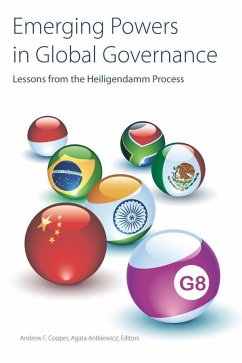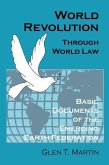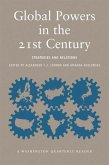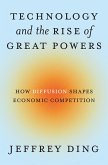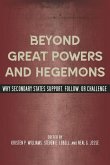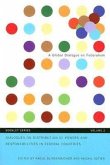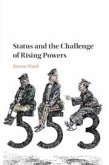Emerging Powers in Global Governance
Lessons from the Heiligendamm Process
Herausgeber: Cooper, Andrew F; Antkiewicz, Agata
Emerging Powers in Global Governance
Lessons from the Heiligendamm Process
Herausgeber: Cooper, Andrew F; Antkiewicz, Agata
- Broschiertes Buch
- Merkliste
- Auf die Merkliste
- Bewerten Bewerten
- Teilen
- Produkt teilen
- Produkterinnerung
- Produkterinnerung
The early twenty-first century has seen the beginning of a considerable shift in the global balance of power. Major international governance challenges can no longer be addressed without the ongoing co-operation of the large countries of the global South. Brazil, Russia, India, China, South Africa, ASEAN states, and Mexico wield great influence in the macro-economic foundations upon which rest the global political economy and institutional architecture. It remains to be seen how the size of the emerging powers translates into the ability to shape the international system to their own will. In…mehr
![Challenges to Emerging and Established Powers Challenges to Emerging and Established Powers]() Challenges to Emerging and Established Powers48,99 €
Challenges to Emerging and Established Powers48,99 €![World Revolution Through World Law: Basic Documents of the Emerging Earth Federation World Revolution Through World Law: Basic Documents of the Emerging Earth Federation]() Glen T. MartinWorld Revolution Through World Law: Basic Documents of the Emerging Earth Federation23,99 €
Glen T. MartinWorld Revolution Through World Law: Basic Documents of the Emerging Earth Federation23,99 €![Global Powers in the 21st Century: Strategies and Relations Global Powers in the 21st Century: Strategies and Relations]() Global Powers in the 21st Century: Strategies and Relations12,99 €
Global Powers in the 21st Century: Strategies and Relations12,99 €![Technology and the Rise of Great Powers Technology and the Rise of Great Powers]() Jeffrey DingTechnology and the Rise of Great Powers33,99 €
Jeffrey DingTechnology and the Rise of Great Powers33,99 €![Beyond Great Powers and Hegemons Beyond Great Powers and Hegemons]() Beyond Great Powers and Hegemons32,99 €
Beyond Great Powers and Hegemons32,99 €![Dialogues on Distribution of Powers and Responsibilities in Federal Countries Dialogues on Distribution of Powers and Responsibilities in Federal Countries]() Raoul BlindenbacherDialogues on Distribution of Powers and Responsibilities in Federal Countries18,99 €
Raoul BlindenbacherDialogues on Distribution of Powers and Responsibilities in Federal Countries18,99 €![Status and the Challenge of Rising Powers Status and the Challenge of Rising Powers]() Steven WardStatus and the Challenge of Rising Powers47,99 €
Steven WardStatus and the Challenge of Rising Powers47,99 €-
-
-
Hinweis: Dieser Artikel kann nur an eine deutsche Lieferadresse ausgeliefert werden.
- Produktdetails
- Verlag: Wilfrid Laurier University Press
- Seitenzahl: 285
- Erscheinungstermin: 30. Oktober 2010
- Englisch
- Abmessung: 221mm x 150mm x 25mm
- Gewicht: 567g
- ISBN-13: 9781554580576
- ISBN-10: 1554580579
- Artikelnr.: 25872227
- Herstellerkennzeichnung
- Libri GmbH
- Europaallee 1
- 36244 Bad Hersfeld
- 06621 890
- Verlag: Wilfrid Laurier University Press
- Seitenzahl: 285
- Erscheinungstermin: 30. Oktober 2010
- Englisch
- Abmessung: 221mm x 150mm x 25mm
- Gewicht: 567g
- ISBN-13: 9781554580576
- ISBN-10: 1554580579
- Artikelnr.: 25872227
- Herstellerkennzeichnung
- Libri GmbH
- Europaallee 1
- 36244 Bad Hersfeld
- 06621 890
the Heiligendamm Process, edited by Andrew F. Cooper and Agata Antkiewicz
Foreword Dirk Messner
Preface Yoginder Alag
Acknowledgements
Abbreviations and Acronyms
1. The Heiligendamm Process: Structural Reordering and Diplomatic Agency
Andrew F. Cooper
2. The Logic of the B(R)ICSAM Model for Global Governance Timothy M.
Shaw, Agata Antkiewicz, and Andrew F. Cooper
3. From G8 2003 to G13 2010? The Heiligendamm Process's Past, Present, and
Future John Kirton
B(R)ICSAM CASE STUDIES
4. China's Evolving G8 Engagement: Complex Interests and Multiple Identity
in Global Governance Reform Gregory T. Chin
5. India and the G8: Reaching Out or Out of Reach? Abdul Nafey
6. Brazil and the G8 Heiligendamm Process Denise Gregory and Paulo
Roberto de Almeida
7. South Africa: Global Reformism, Global Apartheid, and the Heiligendamm
Process Brendan Vickers
8. A Break with the Past or a Natural Progression? Mexico and the
Heiligendamm Process Duncan Wood
9. ASEAN and the G8: Potentially Productive Partners or Two Ships Passing
in the Night? Paul Bowles
THE EVOLVING ARCHITECTURE OF CHANGE
10. Germany and the Heiligendamm Process Thomas Fues and Julia Leininger
11. Why Is the OECD Involved in the Heiligendamm Process? Richard
Woodward
12. Russia and Evolution of the Heiligendamm Process Victoria V. Panova
13. The United States and Summit Reform in a Transformational Era Colin
I. Bradford, Jr.
14. Enhanced Engagement: The Heiligendamm Process and Beyond Alan S.
Alexandroff
List of Contributors
Index
Contributors
Alan S. Alexandroff is a Research Director at the Munk Centre for
International Studies at the University of Toronto. He recently launched
the Global Institutional Reform (GIR) Workshop at CIGI, a project designed
to evaluate the adequacy of institutional reform proposals for the
international system, leading to his edited volume, Can the World Be
Governed? Possibilities for Effective Multilateralism (WLUP, 2008). In
collaboration with Andrew F. Cooper, he is working on a second volume, Can
the World Be Governed? Rising States; Rising Institutions.
Paulo Roberto de Almeida is Professor of International Political Economy at
Uniceub-Brasilia, and Associate Professor at Instituto Rio Branco, the
Brazilian diplomatic academy. He is also a career diplomat since 1977 and
previously served as Minister-Counselor at the Brazilian Embassy in
Washington (1999-2003). He holds a Ph.D. in Social Sciences from the
University of Brussels and an M.A. in International Economy from the
University of Antwerpen. Besides his professional duties, he has engaged in
academic activities in Brazil and abroad. Dr. Almeida is also a researcher
in economic history and international economic relations of Brazil, and has
authored many books in those areas.
Agata Antkiewicz is Senior Researcher and Program Leader at CIGI, where she
oversees the Shifting Global Order research theme as well as the BRICSAM
and economic governance projects. She holds an M.A. in Economics,
specializing in International Trade and International Relations, from the
University of Economics in Wroclaw, Poland. Ms Antkiewicz's authored or
co-authored articles have been published by: The World Economy, Review of
International Organizations, Journal of European Integration, Third World
Quarterly, International Studies Review, Canadian Public Policy Journal,
and National Bureau of Economic Research.
Paul Bowles is Professor of Economics at the University of Northern British
Columbia. He is a past-President of the Canadian Society for the Study of
International Development and is also affiliated with universities in China
and Mexico. He specializes in globalization, regionalism, and East Asian
development. His most recent book is Globalization and National Currencies:
Endangered Species? (Routledge, 2008). His current research projects
include the political economy of China's currency choices and the political
economy of labour and globalization.
Colin I. Bradford, Jr., is Research Professor of Economics and
International Relations at American University and a Non-Resident Senior
Fellow at the Brookings Institution and at CIGI. He has held several
positions, including Chief Economist at the United States Agency for
International Development, Head of Research of the Development Centre of
the OECD, Senior Staff of the Strategic Planning Unit of the World Bank,
and Associate Professor in the Practice of International Economics and
Management at the School of Organization and Management, Yale University.
Gregory T. Chin teaches global politics, comparative politics, and East
Asian political economy in the Department of Political Science and the
Faculty of Graduate Studies at York University. He is a Senior Fellow at
CIGI, and a member of the Advisory Board of the North Korea Research Group
at the University of Toronto. He is a member of the Editorial Board of
Rowman & Littlefield's New Millennium Books Series, and an academic member
of the Editorial Board of the China and International Organization Books
Series, jointly published by Shanghai People's Press and Shanghai
International Studies University. He has held a visiting fellowship at
Peking University (1997-98). His forthcoming book is entitled China's
Automotive Modernization: Industrial Policy and Rival Firms (Palgrave,
2009).
Andrew F. Cooper is Associate Director and Distinguished Fellow at CIGI and
Professor of Political Science at the University of Waterloo, where he
teaches in the areas of International Political Economy, Global Governance,
Comparative and Canadian Foreign Policy, and the Practice of Diplomacy. He
has been a Visiting Professor at Harvard University, the Australian
National University, and in 2009 a Fulbright Visiting Chair of Public
Diplomacy at the University of Southern California. Dr. Cooper's recent
publications include Global Governance and Diplomacy: Worlds Apart?
(Palgrave, 2008), Celebrity Diplomacy (Paradigm, 2007), and Regionalisation
and Global Governance: The Taming of Globalisation? (Routledge, 2007).
Thomas Fues is Senior Research Fellow at the German Development Institute
(DIE). His main research interests are global governance, emerging powers,
United Nations, and international development cooperation. Recent
publications include articles on G8 reform, the role of China and India in
the global system, the UN development sector, as well as human rights and
global governance. In addition to his research tasks, Dr. Fues is
responsible for the Global Governance School at DIE as part of the training
and dialogue programme "Managing Global Governance" with young
professionals from governments and think tanks of emerging economies.
Denise Gregory is a specialist in international relations and business
administration, with experience in the areas of foreign trade, integration,
and international trade negotiations. She was named Executive Director of
the Brazilian Center for International Relations (CEBRI) in December 2004.
Previously, she acted as Institutional Relations Director of Investe
Brasil, and was Chief of Staff to the President of the Brazilian Economic
and Social Development Bank (BNDES). Ms. Gregory has also held positions
with the Executive Secretariat of the Foreign Trade Chamber (CAMEX), and
Department of Foreign Trade Policy within the Foreign Trade Secretariat.
John J. Kirton is a professor of Political Science at the University of
Toronto, where he is a Fellow of Trinity College. Dr. Kirton is the
director of the G8 Research Group, established at the University of Toronto
in 1987. He is also a Research Associate of the Centre for International
Studies, where he leads the Program on Global Health Diplomacy and the G20
Research Group. He has advised the Canadian and Russian governments and the
World Health Organization on G7/8 participation, international trade, and
sustainable development, and has written widely on G7/G8 summitry.
Julia Leininger is Research Fellow at the German Development Institute
(DIE) in the Competitiveness and Social Development department. She is also
an associate of the Peace Research Institute Frankfurt as part of the PRIF/
Research Associate Project: Democracy Promotion through International
Organisations. She has also held research positions with both the German
Federal Ministry For Economic Cooperation and Development (BMZ) and the
United Nations Development Programme. Her current research activities are
in global governance, international institutions, and democracy promotion.
Abdul Nafey is Professor at the Centre for Canadian, US and Latin American
Studies, Jawaharal Nehru University (JNU). Before joining JNU, Dr. Nafey
taught at the Universities of Delhi and Goa. He was Head of the Centre for
Latin American Studies, Goa University in 1989-90. His areas of research
include dynamics of democratic development in Latin America, state and
civil society, structural adjustment and its consequences, social
movements, political and cultural dynamics of Indian diaspora in the
Caribbean, regional integration in Latin America, and security and foreign
policy dynamics of major Latin American and Caribbean countries.
Victoria Panova is Senior Lecturer in International Relations and Foreign
Policy at the Moscow State Institute of International Relations. She is
also Regional Director for Russia of the G8 Research Group based at the
University of Toronto. Dr. Panova is a member of the National Working Group
of the Advisory Council of the Civil G8 project, and was responsible for
the substance and organization of the Civil G8 working group on Human
Security during Russia's 2006 G8 presidency. Her research focuses on
regional conflicts, non-proliferation, terrorism, energy security and
sustainability, as well as global governance (notably the G8) in relation
to Russian civil society.
Timothy M. Shaw is Director and Professor at the Institute of International
Relations, the University of the West Indies St. Augustine. He previously
directed the Institute of Commonwealth Studies at the University of London,
the Centre for Foreign Policy Studies and International Development Studies
programmes at Dalhousie University, where he taught for three decades. Dr.
Shaw holds degrees from three continents and is visiting professor in South
Africa and Uganda. His latest monograph is Commonwealth: Inter- and
Non-State Contributions to Global Governance (Routledge, 2007). He is
general editor for the International Political Economy series for Ashgate
and for Palgrave Macmillan.
Brendan Vickers is Senior Researcher in the multilateral programme at the
Institute for Global Dialogue (IGD). Prior to joining the IGD, he was
employed as the Deputy Director responsible for International Relations and
Trade in the Office of the President of South Africa. He recently completed
a Ph.D. with the University of London, focusing on international trade. Dr.
Vicker's research interests are international trade, the WTO, trade law and
diplomacy, regional integration, South African foreign policy, and
international relations.
Duncan Wood is Director of the Undergraduate Program in International
Relations and Acting Head of the Department of International Studies at the
Instituto Tecnológico Autónomo de México (ITAM). He is a member of the
Mexican National Research System, a member of the editorial board of
Foreign Affairs en Español and has been an editorial advisor to Reforma
newspaper and was a non-resident Fulbright Fellow. Dr. Wood's research
focuses on the Mexican energy sector, Latin American energy policy,
migration and remittances, the political economy of international finance,
and Canada-Mexico relations. In 2009 he will direct the Energy Policy
Studies Center, to be based at ITAM.
Richard Woodward is a lecturer in the Department of Politics and
International Studies at the University of Hull. He has written extensively
on different facets of the OECD's role in global governance and his book on
the organization will shortly be published by Routledge. Currently he is
finalizing his Ph.D. thesis on the governance of the City of London's
financial markets since 1997 and is co-writing (with Simon Lee)
Understanding States and Markets: An Introduction to the History of Ideas
in Political Economy (Palgrave, 2009). His other research interests include
the financial crime, offshore financial centres, and development in small
states.
the Heiligendamm Process, edited by Andrew F. Cooper and Agata Antkiewicz
Foreword Dirk Messner
Preface Yoginder Alag
Acknowledgements
Abbreviations and Acronyms
1. The Heiligendamm Process: Structural Reordering and Diplomatic Agency
Andrew F. Cooper
2. The Logic of the B(R)ICSAM Model for Global Governance Timothy M.
Shaw, Agata Antkiewicz, and Andrew F. Cooper
3. From G8 2003 to G13 2010? The Heiligendamm Process's Past, Present, and
Future John Kirton
B(R)ICSAM CASE STUDIES
4. China's Evolving G8 Engagement: Complex Interests and Multiple Identity
in Global Governance Reform Gregory T. Chin
5. India and the G8: Reaching Out or Out of Reach? Abdul Nafey
6. Brazil and the G8 Heiligendamm Process Denise Gregory and Paulo
Roberto de Almeida
7. South Africa: Global Reformism, Global Apartheid, and the Heiligendamm
Process Brendan Vickers
8. A Break with the Past or a Natural Progression? Mexico and the
Heiligendamm Process Duncan Wood
9. ASEAN and the G8: Potentially Productive Partners or Two Ships Passing
in the Night? Paul Bowles
THE EVOLVING ARCHITECTURE OF CHANGE
10. Germany and the Heiligendamm Process Thomas Fues and Julia Leininger
11. Why Is the OECD Involved in the Heiligendamm Process? Richard
Woodward
12. Russia and Evolution of the Heiligendamm Process Victoria V. Panova
13. The United States and Summit Reform in a Transformational Era Colin
I. Bradford, Jr.
14. Enhanced Engagement: The Heiligendamm Process and Beyond Alan S.
Alexandroff
List of Contributors
Index
Contributors
Alan S. Alexandroff is a Research Director at the Munk Centre for
International Studies at the University of Toronto. He recently launched
the Global Institutional Reform (GIR) Workshop at CIGI, a project designed
to evaluate the adequacy of institutional reform proposals for the
international system, leading to his edited volume, Can the World Be
Governed? Possibilities for Effective Multilateralism (WLUP, 2008). In
collaboration with Andrew F. Cooper, he is working on a second volume, Can
the World Be Governed? Rising States; Rising Institutions.
Paulo Roberto de Almeida is Professor of International Political Economy at
Uniceub-Brasilia, and Associate Professor at Instituto Rio Branco, the
Brazilian diplomatic academy. He is also a career diplomat since 1977 and
previously served as Minister-Counselor at the Brazilian Embassy in
Washington (1999-2003). He holds a Ph.D. in Social Sciences from the
University of Brussels and an M.A. in International Economy from the
University of Antwerpen. Besides his professional duties, he has engaged in
academic activities in Brazil and abroad. Dr. Almeida is also a researcher
in economic history and international economic relations of Brazil, and has
authored many books in those areas.
Agata Antkiewicz is Senior Researcher and Program Leader at CIGI, where she
oversees the Shifting Global Order research theme as well as the BRICSAM
and economic governance projects. She holds an M.A. in Economics,
specializing in International Trade and International Relations, from the
University of Economics in Wroclaw, Poland. Ms Antkiewicz's authored or
co-authored articles have been published by: The World Economy, Review of
International Organizations, Journal of European Integration, Third World
Quarterly, International Studies Review, Canadian Public Policy Journal,
and National Bureau of Economic Research.
Paul Bowles is Professor of Economics at the University of Northern British
Columbia. He is a past-President of the Canadian Society for the Study of
International Development and is also affiliated with universities in China
and Mexico. He specializes in globalization, regionalism, and East Asian
development. His most recent book is Globalization and National Currencies:
Endangered Species? (Routledge, 2008). His current research projects
include the political economy of China's currency choices and the political
economy of labour and globalization.
Colin I. Bradford, Jr., is Research Professor of Economics and
International Relations at American University and a Non-Resident Senior
Fellow at the Brookings Institution and at CIGI. He has held several
positions, including Chief Economist at the United States Agency for
International Development, Head of Research of the Development Centre of
the OECD, Senior Staff of the Strategic Planning Unit of the World Bank,
and Associate Professor in the Practice of International Economics and
Management at the School of Organization and Management, Yale University.
Gregory T. Chin teaches global politics, comparative politics, and East
Asian political economy in the Department of Political Science and the
Faculty of Graduate Studies at York University. He is a Senior Fellow at
CIGI, and a member of the Advisory Board of the North Korea Research Group
at the University of Toronto. He is a member of the Editorial Board of
Rowman & Littlefield's New Millennium Books Series, and an academic member
of the Editorial Board of the China and International Organization Books
Series, jointly published by Shanghai People's Press and Shanghai
International Studies University. He has held a visiting fellowship at
Peking University (1997-98). His forthcoming book is entitled China's
Automotive Modernization: Industrial Policy and Rival Firms (Palgrave,
2009).
Andrew F. Cooper is Associate Director and Distinguished Fellow at CIGI and
Professor of Political Science at the University of Waterloo, where he
teaches in the areas of International Political Economy, Global Governance,
Comparative and Canadian Foreign Policy, and the Practice of Diplomacy. He
has been a Visiting Professor at Harvard University, the Australian
National University, and in 2009 a Fulbright Visiting Chair of Public
Diplomacy at the University of Southern California. Dr. Cooper's recent
publications include Global Governance and Diplomacy: Worlds Apart?
(Palgrave, 2008), Celebrity Diplomacy (Paradigm, 2007), and Regionalisation
and Global Governance: The Taming of Globalisation? (Routledge, 2007).
Thomas Fues is Senior Research Fellow at the German Development Institute
(DIE). His main research interests are global governance, emerging powers,
United Nations, and international development cooperation. Recent
publications include articles on G8 reform, the role of China and India in
the global system, the UN development sector, as well as human rights and
global governance. In addition to his research tasks, Dr. Fues is
responsible for the Global Governance School at DIE as part of the training
and dialogue programme "Managing Global Governance" with young
professionals from governments and think tanks of emerging economies.
Denise Gregory is a specialist in international relations and business
administration, with experience in the areas of foreign trade, integration,
and international trade negotiations. She was named Executive Director of
the Brazilian Center for International Relations (CEBRI) in December 2004.
Previously, she acted as Institutional Relations Director of Investe
Brasil, and was Chief of Staff to the President of the Brazilian Economic
and Social Development Bank (BNDES). Ms. Gregory has also held positions
with the Executive Secretariat of the Foreign Trade Chamber (CAMEX), and
Department of Foreign Trade Policy within the Foreign Trade Secretariat.
John J. Kirton is a professor of Political Science at the University of
Toronto, where he is a Fellow of Trinity College. Dr. Kirton is the
director of the G8 Research Group, established at the University of Toronto
in 1987. He is also a Research Associate of the Centre for International
Studies, where he leads the Program on Global Health Diplomacy and the G20
Research Group. He has advised the Canadian and Russian governments and the
World Health Organization on G7/8 participation, international trade, and
sustainable development, and has written widely on G7/G8 summitry.
Julia Leininger is Research Fellow at the German Development Institute
(DIE) in the Competitiveness and Social Development department. She is also
an associate of the Peace Research Institute Frankfurt as part of the PRIF/
Research Associate Project: Democracy Promotion through International
Organisations. She has also held research positions with both the German
Federal Ministry For Economic Cooperation and Development (BMZ) and the
United Nations Development Programme. Her current research activities are
in global governance, international institutions, and democracy promotion.
Abdul Nafey is Professor at the Centre for Canadian, US and Latin American
Studies, Jawaharal Nehru University (JNU). Before joining JNU, Dr. Nafey
taught at the Universities of Delhi and Goa. He was Head of the Centre for
Latin American Studies, Goa University in 1989-90. His areas of research
include dynamics of democratic development in Latin America, state and
civil society, structural adjustment and its consequences, social
movements, political and cultural dynamics of Indian diaspora in the
Caribbean, regional integration in Latin America, and security and foreign
policy dynamics of major Latin American and Caribbean countries.
Victoria Panova is Senior Lecturer in International Relations and Foreign
Policy at the Moscow State Institute of International Relations. She is
also Regional Director for Russia of the G8 Research Group based at the
University of Toronto. Dr. Panova is a member of the National Working Group
of the Advisory Council of the Civil G8 project, and was responsible for
the substance and organization of the Civil G8 working group on Human
Security during Russia's 2006 G8 presidency. Her research focuses on
regional conflicts, non-proliferation, terrorism, energy security and
sustainability, as well as global governance (notably the G8) in relation
to Russian civil society.
Timothy M. Shaw is Director and Professor at the Institute of International
Relations, the University of the West Indies St. Augustine. He previously
directed the Institute of Commonwealth Studies at the University of London,
the Centre for Foreign Policy Studies and International Development Studies
programmes at Dalhousie University, where he taught for three decades. Dr.
Shaw holds degrees from three continents and is visiting professor in South
Africa and Uganda. His latest monograph is Commonwealth: Inter- and
Non-State Contributions to Global Governance (Routledge, 2007). He is
general editor for the International Political Economy series for Ashgate
and for Palgrave Macmillan.
Brendan Vickers is Senior Researcher in the multilateral programme at the
Institute for Global Dialogue (IGD). Prior to joining the IGD, he was
employed as the Deputy Director responsible for International Relations and
Trade in the Office of the President of South Africa. He recently completed
a Ph.D. with the University of London, focusing on international trade. Dr.
Vicker's research interests are international trade, the WTO, trade law and
diplomacy, regional integration, South African foreign policy, and
international relations.
Duncan Wood is Director of the Undergraduate Program in International
Relations and Acting Head of the Department of International Studies at the
Instituto Tecnológico Autónomo de México (ITAM). He is a member of the
Mexican National Research System, a member of the editorial board of
Foreign Affairs en Español and has been an editorial advisor to Reforma
newspaper and was a non-resident Fulbright Fellow. Dr. Wood's research
focuses on the Mexican energy sector, Latin American energy policy,
migration and remittances, the political economy of international finance,
and Canada-Mexico relations. In 2009 he will direct the Energy Policy
Studies Center, to be based at ITAM.
Richard Woodward is a lecturer in the Department of Politics and
International Studies at the University of Hull. He has written extensively
on different facets of the OECD's role in global governance and his book on
the organization will shortly be published by Routledge. Currently he is
finalizing his Ph.D. thesis on the governance of the City of London's
financial markets since 1997 and is co-writing (with Simon Lee)
Understanding States and Markets: An Introduction to the History of Ideas
in Political Economy (Palgrave, 2009). His other research interests include
the financial crime, offshore financial centres, and development in small
states.

